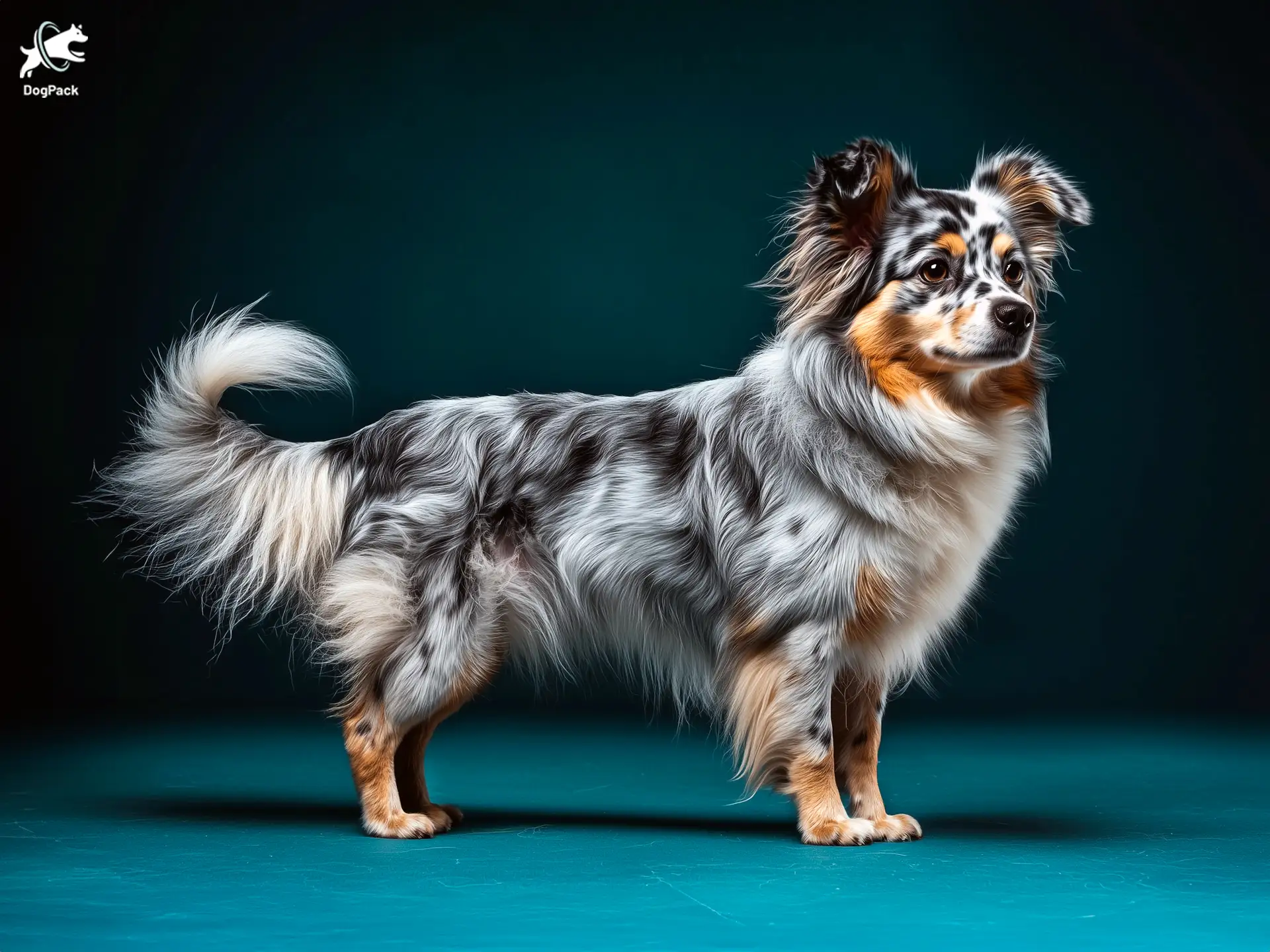Aussiepom Dog Breed Info & Overview
The Aussiepom is a delightful hybrid that brings together the intelligence and energy of the Australian Shepherd with the charm and fluffiness of the Pomeranian. This small but spirited breed loves adventure and companionship, making them great for active families. With their playful nature and affectionate personality, Aussiepoms fit well into homes that offer love, attention, and a bit of fun!
Characteristics
Pictures
Breed History
The Aussiepom is a relatively new hybrid, emerging in the United States over the past couple of decades. Breeders aimed to combine the intelligence and agility of the Australian Shepherd with the compact size and charm of the Pomeranian. While not much is documented about their exact origin, the Aussiepom has quickly gained popularity among those seeking a small yet active companion.
Interestingly, the Australian Shepherd isn’t actually from Australia but was developed in the United States. Combine that with the Pomeranian’s European roots, and you’ve got a globe-trotting lineage packed into a petite frame. The Aussiepom embodies the best traits of both parent breeds, making it a unique addition to the designer dog world.
As hybrid dogs gained popularity in the late 20th and early 21st centuries, the Aussiepom emerged as a sought-after companion. Their rise mirrors a growing interest in dogs that fit modern lifestyles—small enough for apartment living but energetic enough for outdoor adventures.
Temperament, Personality
The Aussiepom is a vivacious and affectionate breed that loves to be the center of attention. They’re known for their sharp minds, inherited from the Australian Shepherd, making them quick learners and eager participants in training sessions. Don’t be surprised if they outsmart you in a game of fetch!
These dogs are typically friendly with children and other pets, especially when socialized early. Their playful nature makes them great playmates, but their Pomeranian side can bring out a bit of stubbornness. Patience and positive reinforcement go a long way with this breed.
While they’re affectionate with family, Aussiepoms can be a tad reserved around strangers. Early socialization helps mitigate any shyness, turning them into social butterflies at the dog park. Their alertness also makes them excellent little watchdogs—they’ll be sure to alert you of any visitors, be it friend or foe.
Physical Characteristics
The Aussiepom boasts a delightful mix of features from both parent breeds. Typically, they have a medium-length double coat that’s fluffy like the Pomeranian but with the coloration of an Australian Shepherd. You might see striking blue merle patterns or even tricolor coats that catch everyone’s eye.
Their ears can be erect like a Pomeranian’s or slightly folded like an Australian Shepherd’s, adding to their unique appearance. Eyes can vary in color, sometimes even exhibiting the mesmerizing blues often seen in Australian Shepherds. Compact and sturdy, they have a well-proportioned body that’s both agile and graceful.
Despite their small size, Aussiepoms have a robust build. Their tails are usually fluffy and may curl over the back, a trait inherited from the Pomeranian side. Overall, they’re a head-turner—a walking conversation starter wherever you go.
Health Issues
Aussiepoms are generally healthy but can inherit health issues common to their parent breeds. They may be prone to hip dysplasia, a condition affecting joint health. Regular vet check-ups can help catch such issues early on.
Eye conditions like cataracts or progressive retinal atrophy are also something to watch out for. Due to their Pomeranian heritage, dental health is crucial—small breeds often struggle with dental issues, so regular teeth cleaning is a must.
Another potential concern is patellar luxation, a common issue in small dogs where the kneecap dislocates. Maintaining a healthy weight and avoiding excessive jumping can help mitigate this risk. Always consult your veterinarian for breed-specific health screenings.
Grooming Needs
The Aussiepom’s coat is a thing of beauty but does require some upkeep. Their moderate shedding means you’ll want to brush them at least two to three times a week to keep their fur tangle-free and to minimize loose hair around the house.
Bathing can be done once a month or as needed, depending on how adventurous your pup gets outdoors. Their ears should be checked regularly for debris to prevent infections, and cleaning them with a vet-approved solution works wonders.
Don’t forget about those nails! Trim them every few weeks to keep them from getting too long. Dental hygiene is equally important—brushing their teeth several times a week will help prevent tartar buildup and keep that adorable smile shining bright.
Exercise Requirements
Despite their small stature, Aussiepoms are quite energetic and need regular exercise to stay happy. Aim for at least 45 minutes to an hour of activity each day. This can include walks around the neighborhood, playtime in the yard, or interactive games indoors.
They’re intelligent dogs that also need mental stimulation. Puzzle toys, training sessions, and agility exercises can keep their minds sharp and prevent boredom. Remember, a bored Aussiepom might resort to chewing your favorite shoes!
These dogs adapt well to apartment living as long as their exercise needs are met. Regular outings to the park or short hikes make excellent adventures for this spirited breed. Just be prepared—they might try to herd you, a nod to their Australian Shepherd lineage.
Training Tips
Training an Aussiepom can be a delightful experience thanks to their intelligence and eagerness to please. Positive reinforcement methods work best—think treats, praise, and lots of belly rubs. Consistency is key to helping them grasp new commands.
Socialization from a young age helps curb any timidness or overprotective behaviors. Expose them to different environments, people, and other animals to build their confidence. Puppy classes can be a great way to start.
Keep training sessions short and fun to hold their attention. Incorporate a variety of activities to prevent them from becoming bored. Remember, with their sharp minds, they might just teach you a thing or two!
Nutrition, Diet
Feeding your Aussiepom a balanced diet is essential for their health and energy levels. Typically, they require about 1 to 1.5 cups of high-quality dry dog food per day, divided into two meals. Choose a formula that’s appropriate for small breeds with moderate energy levels.
Keep an eye on their weight, as Aussiepoms can be prone to obesity if overfed. Treats are great for training but should be given in moderation. Consult your veterinarian to tailor a diet plan that suits your individual dog’s needs, especially if they have any food sensitivities.
Hydration is also important, so ensure fresh water is always available. If you’re considering a raw or homemade diet, discuss it with your vet to ensure it meets all nutritional requirements. Every Aussiepom is unique, so their dietary needs may vary.
Adoption, Breeders
If you’re looking to welcome an Aussiepom into your home, consider checking local shelters and rescue groups first. Hybrid breeds often end up in need of a loving family. Websites like Petfinder or Mawoo Pets can help you locate Aussiepoms puppies available for sale or adoption near you.
Should you opt for a breeder, make sure they’re reputable and prioritize the health of their dogs. Ask for health clearances for both parent breeds to ensure your future pup has the best start in life. The American Kennel Club’s Breeder Referral is a good resource to find responsible breeders.
Be wary of puppy mills or breeders who can’t provide proper documentation. A trustworthy breeder will be happy to answer all your questions and may even ask a few of their own to ensure their pups are going to a good home.
Family Pet?
The Aussiepom makes a wonderful family pet, especially for those who can match their energy and affection. They’re generally good with children, loving the playtime and attention that kids provide. Just remember to supervise interactions to ensure gentle play on both sides.
Their adaptability makes them suitable for households with other pets, including cats and dogs. Early socialization is key to fostering harmonious relationships. Their friendly demeanor can light up any household, making them a beloved member of the family.
For seniors or individuals living in smaller spaces, the Aussiepom offers companionship without demanding excessive space. Their moderate exercise needs are manageable, and their loving nature provides endless emotional rewards.
Right For You?
If you’re seeking a small dog with a big personality, the Aussiepom might just be your perfect match. They’re ideal for active individuals or families who can provide the mental and physical stimulation they crave. Their adaptability to different living situations is a bonus.
However, if you’re away from home frequently or unable to commit to regular exercise and grooming, this breed might present a challenge. They thrive on companionship and can develop separation anxiety if left alone for long periods.
Ultimately, the Aussiepom offers a delightful blend of energy, intelligence, and affection. They’re a charming addition to the right household, bringing joy and a touch of playful mischief to everyday life.
Conclusion
The Aussiepom is a delightful companion that combines the best of the Australian Shepherd and Pomeranian breeds. With their lively spirit, intelligence, and affectionate nature, they make a fantastic addition to many households. If you’re ready for a playful, loving, and occasionally cheeky friend, the Aussiepom could be the perfect fit for you.
FAQs
-
Are Aussiepoms hypoallergenic?
No, Aussiepoms are not considered hypoallergenic. They have a double coat that sheds moderately, which may not be suitable for those with allergies.
-
How big does an Aussiepom get?
An Aussiepom typically weighs between 10–30 pounds (5–14 kg) and stands about 12–17 inches (31–43 cm) tall, making them a small to medium-sized dog.
-
Do Aussiepoms bark a lot?
They can be vocal, especially if they inherit the Pomeranian’s tendency to bark. Early training can help manage excessive barking behaviors.
-
What kind of coat colors do Aussiepoms have?
Aussiepoms can have a variety of coat colors, including blue merle, black, red, or even tricolor patterns, often reflecting the Australian Shepherd’s diverse coloring.
-
Is the Aussiepom good for first-time dog owners?
Yes, with their manageable size and trainable nature, Aussiepoms can be suitable for first-time owners willing to invest time in training and exercise.
Breed Ratings
The Aussiepom is highly intelligent, making training a rewarding experience.
They love to play and enjoy interactive games with their family.
With moderate to high energy, they need daily exercise to stay content.
Moderate shedding requires regular brushing to manage.
They have a low to moderate prey drive but may chase small animals occasionally.
Grooming is manageable but requires consistency due to their fluffy coat.
Eager to please and smart, they respond well to positive training methods.
They prefer company and may experience separation anxiety if left alone too long.
Can be vocal, especially when bored or alerting to strangers.
Minimal drooling, keeping your clothes and furniture drool-free.
Generally gets along well with other dogs when socialized early.
Mostly healthy but watch for breed-specific health issues.













